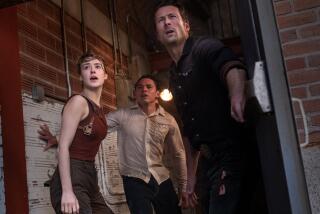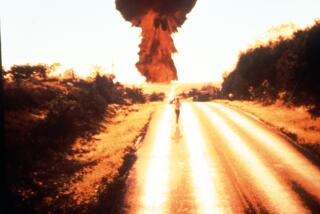The Big Picture: A message too ‘Dark’ for all?
Just hours before 12 people died and dozens were wounded in the “Dark Knight Rises” movie theater massacre in Aurora, Colo., I was at a screening of “Gangster Squad,” an upcomingWarner Bros. film about a war between 1949-era L.A. cops and the gangster Mickey Cohen. One of the bloodiest scenes in the film featured a scrum of gangsters nonchalantly shooting up a movie theater, causing a panic as they killed scores of innocent filmgoers.
The studio has already cut the scene from the film’s trailer and may edit it out of the movie, due in September. But when I first heard the news about the Aurora killings, it was like waking up from a bad dream where life had imitated art — or was it the other way around?
It’s just one of the many puzzling questions behind the Aurora tragedy, which are being called the largest mass shooting in U.S. history. Even though the killing suspect, James Holmes, had not seen “Dark Knight Rises,” he was clearly somehow attracted to its hypnotic spell. Police say he wore a gas mask during his shooting spree that obscured his face, not unlike the ventilator mask worn by the villain in the film. He told police that he was the Joker, the character played by Heath Ledger in “The Dark Knight.” He also allegedly picked as his victims fans so eager to see “Dark Knight Rises” that they’d stayed up past midnight for the first local screening.
PHOTOS: Celebrities react to Colorado shooting
The killings represent a huge blow to the entertainment industry, which, like it or not, finds itself linked to a tragedy. As news of the massacre spread, it felt as if just as many people were loudly decrying violence in movies as were pushing for limitations on people’s easy access to guns.
The “Dark Knight Rises” debate hit close to home. In the last week, there’s been a lively debate in my own family over the hundreds of billboards around town that depict Batman staring down his masked villain, Bane. My wife found the image profoundly disturbing, saying it was all too reminiscent of the creepy hockey-masked killer in the “Friday the 13th” horror series. Her complaints fell on deaf ears. “Come on, Mom, it just looks like a gas mask,” my son said. “Don’t be such a wuss.”
Our own domestic debate mirrored a larger one in the culture. It’s one thing to see images of violence and brutality in our movies; it’s another thing to be subjected to them through a massive onslaught of ubiquitous movie advertising. That’s what troubles me the most about the Aurora killings: the possibility that the accused killer’s violent fantasies had somehow been inflamed not by the movie but by the unsettling advertising images surrounding it.
After all, if the gunman was looking for a mass of people, he could just as easily have gone to a crowded baseball game or a pop concert. Instead, he was drawn to a screening of “Dark Knight Rises.” Like John Wilkes Booth before him, who shot Abraham Lincoln during a performance of a popular play of the day, the theater offered him a stage. He was also drawn to a film that portrays the world threatened by lawless marauders.
TIMELINE: Mass shootings in the U.S.
Right now, nothing burns as bright as “Dark Knight.” But it is two things at once: a giant fireball of mass marketing as well as a disturbing, dystopian vision of our culture. That makes it a powerful magnet, both for passionate fans and sometimes, for crazed nutcases. As Slate’s Dana Stevens wrote: “I’m not suggesting that the young men of America are being brainwashed by Christopher Nolan into going on Bane-style killing sprees… But James Holmes didn’t burst into a screening of’Happy Feet Two.’”
It was telling that within 24 hours of the tragedy, everyone was viewing the events through the prism of their own beliefs. From the left, filmmaker Michael Moore was saying that the killings would cause historians to “conclude that we were a violent nation,” while on the right, Texas Rep. Louie Gohmert was wondering: “With all those people in the theater, was there nobody that was carrying a gun that could have stopped this guy?”
This, of course, has happened before. In 1981, “Taxi Driver”became embroiled in controversy when John Hinckley Jr. tried to assassinate then-President Ronald Reagan after becoming obsessed with the film, whose character Travis Bickle attempts to kill a presidential candidate. In Hinckley’s case, he was affected by the movie. With the Colorado gunman, the inspiration may well have come from the powerful gravitational pull of a mammoth Hollywood Big Event.
In almost any big city today, it’s nearly impossible to avoid being exposed to the wall-to-wall advertising for a global behemoth such as “Dark Knight.” The result is almost Orwellian — nearly everywhere you look, your gaze meets the stern glare of Batman and his nemesis, their eyes full of menace. On TV, the film’s ads are chock full of thunderous collisions and mass brawls.
Talk about life imitating art. Days before the film’s release, the movie review aggregation site Rotten Tomatoes had to suspend user comments on reviews of “Dark Knight” after readers made derogatory and threatening remarks about the critics who wrote them. Incensed fans heaped abuse on one critic, Marshal Fine, saying he should “die in a fire.” Rotten Tomatoes’ editor said it was the first time the site had suspended user comments, explaining that “it just got to be too much hate.”
It isn’t Nolan’s fault that he made a film that inspires such a fire-breathing response. Powerful art often provokes an equally potent reaction. But while Nolan has full control over the images in the story he tells, it is less clear, in an era of carpet bombing-style marketing, whether anyone has any real control over how those images are digested by unhinged people out in the world.
I’ve always believed that artists should have the right to explore whatever territory they want, no matter how dark or discordant. But the public has rights too. We’ve always heard that if you don’t like what you see on your TV, you can turn it off. But today’s gargantuan Hollywood marketing campaigns are so all-pervasive that we can’t close our eyes and blink away the images.
It’s time studio marketers exercised self-restraint, especially with a film that packs as visceral a punch as “Dark Knight.” It may be easier than ever to reach every eyeball in the country, but advertising images, like the powers of a superhero, can end up being used for good or evil. Maybe in the wake of the Aurora tragedy, when it comes to promoting a movie, it’s time to think long and hard about what kind of message is being sent.
Twitter: @patrickbigpix
ALSO:
Kenneth Turan: Skip the blame game and take action
Christopher Nolan reacts: ‘The movie theater is my home’
Christian Bale, Anne Hathaway speak out on Colorado tragedy
MORE ON ‘DARK KNIGHT RISES’ SHOOTING
PHOTOS: Colorado movie theater shooting
PHOTOS: Hollywood reacts to shooting
‘Dark Knight Rises’ shootings have eerie overtones
More to Read
Only good movies
Get the Indie Focus newsletter, Mark Olsen's weekly guide to the world of cinema.
You may occasionally receive promotional content from the Los Angeles Times.










